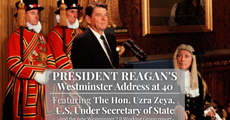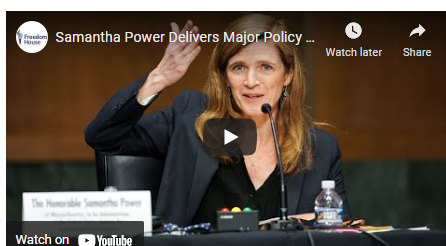The war in Ukraine is a vivid real-time reminder of the urgency of the task of modernizing and reinvigorating approaches and efforts to advance freedom around the world, according to Mark Andrew Green and Kenneth Wollack, co-chairs of the Ronald Reagan Institute’s Westminster 2.0 Working Group.
Tasked with updating the strategy outlined in Reagan’s speech, the group developed a set of recommendations for how to develop the necessary strategy, tools, and resources, they write for RealClearPolitics:
- The Working Group’s first recommendation is aimed at developing 21st-century digital tools to assist the fight for freedom. The United States should dedicate additional resources to identify critical technology needs and develop targeted digital tools. For example, secure correspondence technology could equip citizens in closed countries with the digital tools necessary to organize and overcome surveillance….
 Second, the United States and its democratic partners should develop a disruptive digital platform matching the needs of those seeking democracy assistance (including funding, equipment, infrastructure, and legal assistance) with those who can meet those needs. Called an International Platform for Freedom, this effort would leverage government, civil society, and private sector resources and bring these sectors together to create a web-based platform that could empower groups, activists, and journalists fighting against disinformation and for other democratic freedoms.
Second, the United States and its democratic partners should develop a disruptive digital platform matching the needs of those seeking democracy assistance (including funding, equipment, infrastructure, and legal assistance) with those who can meet those needs. Called an International Platform for Freedom, this effort would leverage government, civil society, and private sector resources and bring these sectors together to create a web-based platform that could empower groups, activists, and journalists fighting against disinformation and for other democratic freedoms.- Third, we should underscore the connection between anti-corruption and democratization efforts. Organizations implementing democracy projects and the donors supporting these initiatives should incorporate combatting corruption as part of their programs. They should focus on how best to hold corrupt leaders accountable, whether that includes advancing government transparency, training journalists in investigative tactics, or calling for monitoring mechanisms, such as disclosure requirements and civil society watchdog efforts…
 Fourth, we must understand and empower the role of a free press in holding power to account. Congress should devote greater resources to the U.S.-funded international broadcast networks and create a new, independent grant-making entity to support independent media. This effort would bolster the mission of networks funded by the U.S. Agency for Global Media and the International Fund for Public Interest Media …..
Fourth, we must understand and empower the role of a free press in holding power to account. Congress should devote greater resources to the U.S.-funded international broadcast networks and create a new, independent grant-making entity to support independent media. This effort would bolster the mission of networks funded by the U.S. Agency for Global Media and the International Fund for Public Interest Media …..- Finally, the United States should work more closely with its allies and partners in the free world, while building more flexible coalitions around specific pillars of free societies. To broaden its range of partners, the U.S. should encourage small states or those that are not traditionally involved in these efforts to take a leading role by bringing them together in groups focused on specific issue areas. These “micro-lateral” groupings committed to particular ideals would be more nimble, easier to organize, and flexible enough to allow countries to participate in the issues that speak to their expertise and commitment. RTWT
 In addition to the powerful rhetorical impact of President Reagan’s Westminster address, the speech motivated policy change, TSNR’S War On The Rocks adds: Less than a year after the speech was delivered, the U.S. Congress approved the formation of the National Endowment for Democracy (NED) to aid democracy movements abroad. In this week’s episode of Horns of a Dilemma, Clements Center Executive Director (and TNSR Editor in Chief) Will Inboden discusses the speech and its legacy with Rachel Hoff, policy director of the Ronald Reagan Presidential Foundation and a former NED Penn Kemble fellow.
In addition to the powerful rhetorical impact of President Reagan’s Westminster address, the speech motivated policy change, TSNR’S War On The Rocks adds: Less than a year after the speech was delivered, the U.S. Congress approved the formation of the National Endowment for Democracy (NED) to aid democracy movements abroad. In this week’s episode of Horns of a Dilemma, Clements Center Executive Director (and TNSR Editor in Chief) Will Inboden discusses the speech and its legacy with Rachel Hoff, policy director of the Ronald Reagan Presidential Foundation and a former NED Penn Kemble fellow.
Network of Liberty
So, what would today’s equivalent of Reagan’s call to democratic arms look like? British MP Richard Graham asks in PoliticsHome. The UK Foreign Secretary’s speech on the Network of Liberty reflected many of the key ingredients. Her four pillars of security, trade, investment, and technology alliances recognize one of our great collective modern failures – not providing young democracies with infrastructure funding to boost open and prosperous economies.
Reagan advocated for assistance to foster the infrastructure of democracy—a free press, civil society, political parties, and universities—a call that led to democracy assistance as we know it, USAID’s Samantha Power observed in a keynote address. It helped transform countries locked behind the Iron Curtain into proud, thriving members of a free Europe and helped nascent democracies in Asia, Africa, and Latin America develop sustainable democratic institutions.

In the throes of the Cold War, when the American political and academic establishments almost in their entirety took for granted the continued strength and global influence of the Soviet Union, Reagan turned Marxist revolutionary theory on its head, Joseph Loconte writes for National Review.
Ukraine has taken up the challenge which Reagan laid down 40 years ago, on its own behalf. If the West does not help Ukraine enough, it risks losing its gains from victory in the Cold War – not to mention the grain needed to feed the world, The Telegraph’s Charles Moore writes:
Although Communism has never regained its hold on the continent of Europe, the situation may be worse now than then. Vladimir Putin may not believe in Marxism-Leninism, but he has as little respect as Stalin for the independence of free countries. He shares Stalin’s obsession with controlling places he chooses to regard as Russian even when international law and democratic opinion say otherwise. He borrows Stalin’s methods – the shooting, bombing, rape, starvation and torture of civilians, deportation, using prisoners as hostages, puppet regimes and the looting of grain.
IRI created a commemorative video (below) to mark the Westminster anniversary and to illustrate that President Reagan’s remarks are as relevant today as 40 years ago.
Our work to strengthen democracy & counter authoritarianism is as critical today as it was 40 years ago when President Reagan delivered his Westminster Speech. Thank you @ReaganInstitute & @RogerZakheim for a great discussion yesterday. #StandWithUkraine https://t.co/JWDLxTEDJL pic.twitter.com/88pgrtiqtx
— Under Secretary Uzra Zeya (@UnderSecStateJ) June 2, 2022







